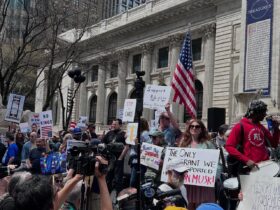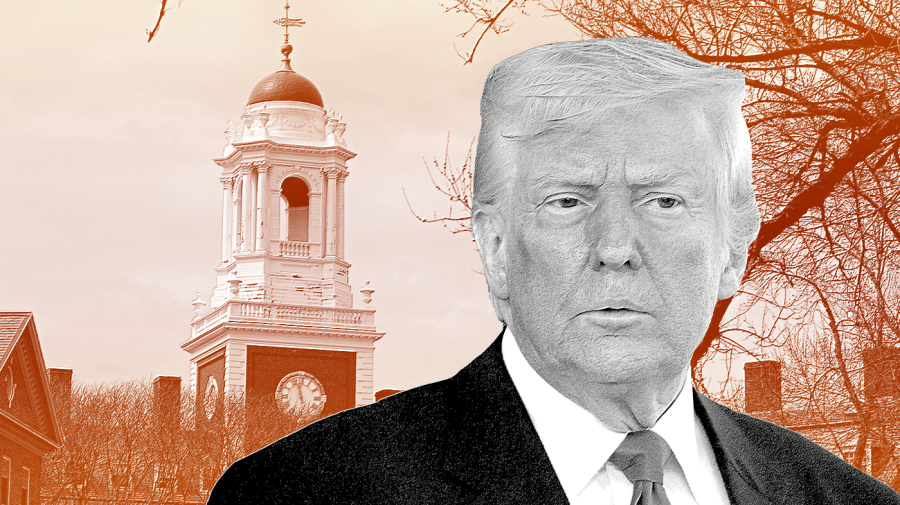On April 14, Harvard University chose to counter the Trump administration’s assault on civil liberties and defend the First Amendment and academic independence. The university risks losing billions of dollars in federal funding as a result.
Harvard’s choice may prove to be historic. For those wondering what forms “The Resistance” to the president’s abuse of power can take, Harvard has finally given us a tangible example.
Harvard rejected the Trump administration’s demands to curtail activism on campus and make changes in admissions, hiring and DEI programs. In response, the administration is freezing more than $2.2 billion in federal grants to the university, and has threatened to deny almost $9 billion total in grants in contracts.
Harvard’s president, Alan Garber, made the university’s position clear: “The University will not surrender its independence or relinquish its constitutional rights,” he wrote in a letter emailed to the Harvard community.
In its defiance, Harvard has asserted itself as the leading private university in the country. But Harvard cannot counter President Trump’s overreach by itself. Now is the moment for other universities to join Harvard in rebuking the Trump administration.
Take the case of Cornell. On April 8, the administration froze more than a billion dollars in federal funding for the university, claiming its investigation of alleged civil rights violations of Jewish students will determine the release of the funds. Cornell’s leaders may be tempted to walk a rhetorical tightrope between asserting academic independence and supplicating its federal funders. But doing so would be a mistake.
Instead, Cornell must decide what its standing is, and ought to be, as an institution of higher education. To help make this decision, its leaders need to ask some basic questions.
They need to ask whether this is only about antisemitism — or even about it at all. They need to ask what the deeper and long-term costs are, apart from money, of securing this funding by walking lockstep with the Trump administration. They need to ask what constitutes power and how much of it they will cede to the president.
Above all, they must decide whether they will defend free inquiry, the search for truth, and the rights guaranteed by the First Amendment.
One person’s critique of foreign policy can easily be distorted into another’s antisemitism. That’s why school leaders should view the freezing of funds as, mostly, a poorly disguised effort to squash political dissent — yet another example of Trump following the authoritarian playbook.
Power, at its root, is simple. It means getting other people to do what you want them to do. Donald Trump has managed to do that so often that he has become emboldened and reckless. As boss of the MAGA Party, he now makes offers to universities they “can’t refuse.”
But they can refuse. University leaders should follow Harvard’s example and wake up to their own power. Cornell and others can — and should — deal with any bona fide antisemitism and harassment on campus. And they can do so quite capably without being threatened and without curtailing rights to free speech.
No, Mr. President, we will not ask our students to shut up. We will not stop teaching the actual history of our country. We will not pretend like race and class do not exist. We will not pretend like we know nothing about climate change.
Long before the federal government funded research, universities invested in scholars and the pursuit of knowledge. One billion dollars is a huge amount of money. But Cornell can raise it. Bill Gates could cut one check and it would be done with.
Michael Kotlikoff, the president of Cornell, does not to need to say much. But he needs to say it simply, clearly and audaciously.
First, he should state that antisemitism, hate speech and harassment will not be tolerated. Second, that students are free to peacefully protest the foreign policy of the U.S. or any government — including the murderous violence of either Hamas or the Israeli military. Third, he should make clear that Cornell is committed to the free exchange of ideas and the pursuit of truth, something Trump seems incapable of understanding.
We will not be held hostage by ignorance. Nor will we be bullied. To Trump and his administration, Cornell needs only two words: “Get lost.”
Andrew Smith is a writer living in Washington, D.C., with a background in education and intercultural communication.
















Leave a Reply